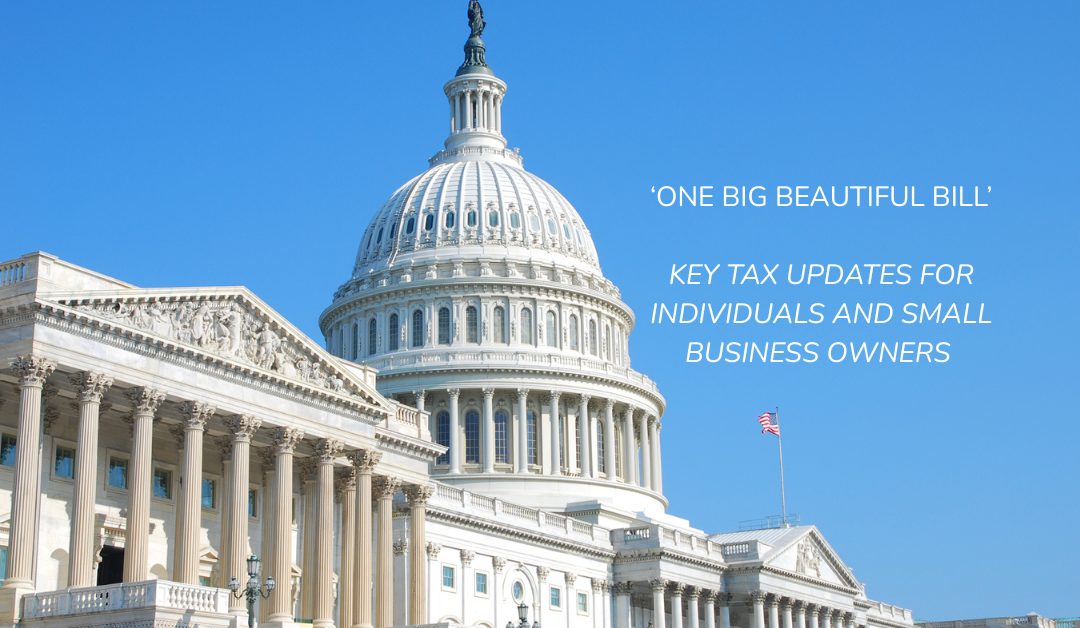What is the Big Beautiful Bill?
Let’s cut through the noise. In July 2025, Congress passed a sweeping tax package officially known as the One Big Beautiful Bill (OBBB), later renamed H.R. 1. Whether you’re a homeowner, small business owner, electric vehicle driver, or someone who just wants to avoid IRS headaches, there are several tax changes that could directly impact your bottom line.
Here’s what you need to know.
Quick Highlights: OBBB 2025 Tax Changes
For Individuals
- Tax Rates – 37% top rate made permanent
- SALT Cap – Raised to $40,000 in 2025 (with income limits)
- New Deductions (2025-2028) – Car loan interest (new U.S.-assembled vehicles), tip income, and overtime pay
- Senior Deduction – Up to $6,000 ($12,000 for couples) for those 65+
- Home Energy Credits End – Must install by Dec. 31, 2025
- EV Credits End – Must purchase and take delivery by Sept. 30, 2025
For Small Businesses
- QBI Deduction – Up to 20% made permanent
- Bonus Depreciation – 100% expensing made permanent
- Section 179 – Limit increased to $2.5M
- Energy-Efficient Deduction Ends – Must complete by June 30, 2026
- 1099 Threshold – Increases to $2,000 starting in 2026
What’s In It for Individuals and Families

Tax Rates
The OBBB permanently extended the tax rates passed in the Tax Cuts and Jobs Act (TCJA – 2017) with a top marginal tax rate of 37 percent. Without passage of the OBBB, marginal tax rates would have reverted to pre-TCJA rates, with a top marginal tax bracket of 39.6 percent starting in tax year 2026.
SALT Limitations Increased
The limitation on individual deductions for certain state and local taxes (collectively called SALT) was increased from the $10,000 limit under the TCJA to $40,000 for tax year 2025. The limitation will increase by 1 percent over the prior year’s limit for tax years 2026-2029, and will revert to the TCJA cap of $10,000 in 2030 and later years.
Eligibility to claim the higher SALT deduction is subject to income limitations. Those with MAGI exceeding $500,000 ($250,000 if married filing separately) will not be eligible to claim the credit in 2025. This limitation increases to $505,000 ($252,500 if married filing separately) in 2026 and will further increase by 1 percent over the previous year for tax years 2027-2029. The SALT limitation will not decrease below $10,000 for those ineligible to claim the enhanced SALT deduction.
Other Deductions: Car Loan Interest, Tip, and Overtime
There are three new deductions for qualifying individuals, even if they do not itemize deductions:
- Car Loan Interest Deduction – For tax years 2025-2028, if you purchase certain new (not used) personal-use vehicles assembled in the United States, you may be able to deduct up to $10,000 of the interest paid on the loan. The deduction starts phasing out at $100,000 for single taxpayers and $200,000 for married filing jointly. Lenders will need to provide statements showing the amount of interest paid, and the vehicle VIN will need to be reported on your tax return.
- Tip Deduction – If your W-2 shows tip income, or you self-report tip income, for tax years 2025-2028 you may be able to deduct tip income up to $25,000. The deduction starts phasing out at $150,000 for single filers and $300,000 for married filing jointly. The IRS will publish a list of occupations that “customarily and regularly” receive tips. Employers will be required to file information returns with the IRS and provide statements showing the occupation and amount of tips eligible for the deduction.
- Overtime Deduction – If your W-2 shows overtime pay for tax years 2025-2028, you may be able to deduct up to $12,500 of overtime pay income. This includes only the overtime premium received. The deduction starts phasing out at $150,000 for single filers and $300,000 for married filing jointly. Employers will need to file information returns with the IRS and provide statements showing the eligible overtime amount.
Senior Deduction
For tax years 2025-2028, you may claim up to a $6,000 deduction if you are age 65 or older by the last day of the tax year and file as single. If married filing jointly and one spouse meets the criteria, you can claim up to $6,000. If both spouses meet the criteria, you can claim up to $12,000. The deduction phases out at $75,000 for single filers and $150,000 for married filing jointly. The OBBB did not change the calculation for the taxability of Social Security benefits.
Home Energy Tax Credits: Ending Soon
You can still claim credits for making energy-efficient upgrades to your primary residence, but the credit ends on December 31, 2025.
Eligible improvements may include:
- Insulation and air sealing
- High-efficiency windows and doors
- Heat pumps or heat pump water heaters
- Solar panels or battery storage
- Electrical panel upgrades (if part of an energy project)
- Home energy audits
Qualifying improvements installed on or before December 31, 2025 could be eligible for up to a 30 percent tax credit based on improvement costs. Improvements installed after that date will not be eligible.
Electric Vehicle Credits: Ending Soon
You can still claim a federal tax credit of up to $7,500 for new EVs and $4,000 for used EVs, but there’s an important deadline: The EV tax credit expires September 30, 2025.
This change shortens the original expiration date (previously set for 2032) and applies to all buyers, regardless of manufacturer. To qualify, you must purchase and take delivery of the vehicle by September 30, 2025.
Other requirements still apply:
- Income limits ($300,000 for joint filers, $150,000 for individuals)
- Price caps and assembly requirements
- Restrictions on battery sourcing for full credit eligibility
The “lease loophole,” which allowed many EVs to qualify through commercial leases, will also end on that date.
What Small Business Owners Should Know

Permanent Small Business Tax Deductions
The OBBB makes the Qualified Business Income (QBI) deduction permanent, allowing eligible pass-through businesses (LLCs, sole proprietors, partnerships, S corps) to continue deducting up to 20 percent of qualified income.
The bill also makes 100 percent bonus depreciation of qualified property permanent, replacing the TCJA phase-out schedule. This applies to qualifying property acquired after January 19, 2025, generally including assets with MACRS lives of 20 years or less (equipment, furniture, and fixtures).
The Section 179 election expensing limit increases from $1 million to $2.5 million, with the phase-out threshold increasing from $2.5 million to $4 million.
Energy-Efficient Business Credits Sunset
Businesses may be eligible for a deduction of up to $5 per square foot for energy-efficient improvements, but the work must be completed by June 30, 2026.
EVs used for business may still qualify for credits or deductions before September 30, 2025, but detailed logs are essential.
Threshold for Information Reporting Increases
For payments made after December 31, 2025, the threshold for filing certain 1099 information returns will increase from $600 to $2,000. This means businesses will file Forms 1099-NEC or 1099-MISC only for vendors paid more than $2,000. Starting in calendar year 2027, the $2,000 threshold will be indexed to inflation using 2025 as the base year.
For provisions marked as “permanent,” this means they remain in effect until Congress changes the law in the future.
What You Can Do Now
This is a great time for a mid-year check-in with your tax advisor to:
- See if you qualify for energy or business deductions
- Plan large purchases before tax credits expire
- Adjust estimated payments or withholdings
- Prepare for potential audits or IRS outreach
How DMA Can Help
At DMA Tax & Accounting, our job is to make complex tax laws easier to understand. Whether you’re looking to maximize savings, avoid surprises, or plan confidently, we’re here to help. Let’s review your tax strategy before the end of the year so you can take full advantage of what’s available.
Disclaimer:
This article is for informational purposes only and does not constitute legal, financial, or tax advice. Every individual and business has unique circumstances. Please consult a qualified tax professional to discuss how these changes may apply to your specific situation.



Recent Comments